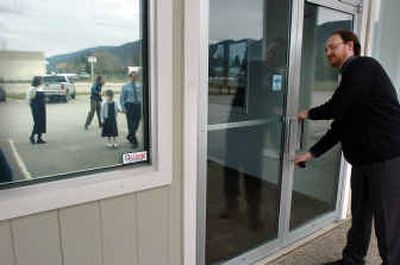Bonner County getting clinic for the uninsured

A federally funded local health clinic with doctors, dentists and mental health counselors will open for Bonner County’s thousands of uninsured residents this summer.
The operation is an expansion of the Boundary Community Health Clinic, which just received a $650,000 grant from U.S. Health and Human Services to open a Bonner clinic and run it for its first year. The grant is renewable and will supplement fees patients will pay, said Andrew Bolton, director of the Boundary clinic.
“At full operational capacity, we’re looking at reaching 7,000 patients in Bonner County between medical, dental and mental health services,” Bolton said Thursday. “We’ll provide about 23,000 patient encounters per year.”
The HHS grant is part of a federal program to expand nonprofit community clinics that provide health care to people without health insurance or to people with Medicare or Medicaid who can’t find a doctor to accept their programs. The five-year program is entering its fifth year as the nationwide rate of uninsured reaches 16 percent. North Idaho’s uninsured rate averages 27 percent, said Karen Cotton, project manager for North Idaho Partners in Care.
The Bonner operation will offer a permanent clinic in Ponderay at 1109 Fontaine, about a quarter-mile south of the Bonner Mall. A mobile clinic will travel regularly throughout the county offering primary medical care and dental services. Bolton said he’s recruiting a dentist and dental hygienist now for the mobile clinic, which is scheduled to start its increased schedule in Bonner County in June.
The permanent clinic also will offer medical, dental and mental health services, including drug abuse counseling. Work is under way now to renovate a former plumbing supply shop into a clinic with exam rooms. Bolton said the permanent clinic most likely will open in late summer.
He said he chose Ponderay because it’s a highly accessible point for all Bonner residents. He particularly wanted the clinic accessible to residents of the eastern third of the county. HHS designated that area medically underserved.
The Bonner clinic will share administration with the Boundary clinic but will have its own site director. The two clinics will share a board of directors, composed largely of clinic users. Bolton said 13 of the 15 board members now are clients, which exceeds the grant requirement of 50 percent.
“We’re very much consumer-driven,” he said.
The Bonner clinic will pattern its payment schedule after the Boundary clinic. Bolton said he expects a similar breakdown in clients. Boundary serves about 1,700 patients per month. Thirty percent of those patients have no insurance and about 25 percent are considered underinsured, meaning they have insurance with deductibles of at least $5,000 – usually the only way they can afford insurance. The remainder of patients has Medicare, Medicaid or private insurance.
Patients at the Boundary clinic pay on a sliding scale based on their incomes.
Bonner County Commissioner Marcia Phillips cheered at the news of the upcoming community clinic.
“This will be a great partner in our medical community,” she said. “People who need help will get it and won’t have huge emergency room medical bills.”
The county keeps a taxpayer-fed community assistance fund to help residents pay for medical disasters. It pays the first $10,000 for people eligible, and the state catastrophic health care fund pays the rest. Phillips said many claims that draw on that fund are for medical problems that people could have avoided with early and less-expensive treatment. But people without insurance often don’t head to a doctor until they have to because they can’t pay for the service.
“Now people will have the chance to get help, and some expenses to the county will be alleviated,” she said. “I’m just thrilled.”
Federally funded community clinics operate in Bonners Ferry, Coeur d’Alene and Plummer. Lora Cartelli, who once directed Bonner County’s community assistance fund, started a free and low-cost clinic in Sandpoint with a small grant in July 2003. The Panhandle Health District donates its offices one night each week for the clinic, and 10 doctors, two physician’s assistants and 13 nurses as well as dozens of support people volunteer their time.
It’s a stop-gap operation Cartelli hoped would lead to something permanent. Her Partners in Care clinic often referred patients to the Boundary Community Health Clinic or Dirne Clinic for long-term and follow-up care. Thursday’s news about a community clinic in Bonner County pleased her.
“It’s not competition,” she said, chuckling at the idea. “It’s a continuum of health care for Bonner County.”